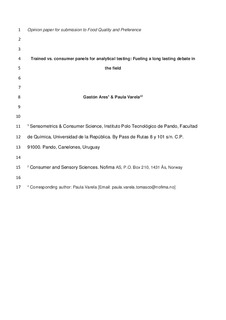Trained vs. consumer panels for analytical testing: Fueling a long lasting debate in the field
Peer reviewed, Journal article
Accepted version
Permanent lenke
http://hdl.handle.net/11250/2494580Utgivelsesdato
2017Metadata
Vis full innførselSamlinger
- Artikler / Articles [1419]
- Publikasjoner fra CRIStin [2481]
Sammendrag
Sensory evaluation has traditionally been divided into two clearly defined areas: analytical tests, aimed at objectively evaluating the sensory characteristics of products, and hedonic tests, in which consumers evaluate their acceptance/preference. One of the central dogmas of the field has been matching these two types of tests to different types of assessors respectively: selected and trained assessors and regular consumers of the target products. For years, consumers have been regarded as not capable of performing analytical tasks. However, the development of various alternative methods for sensory characterization in the last couple of decades has agitated the debate about the use of untrained assessors for analytical tasks in sensory science. Lately, the line between trained and consumer panels for analytical tests has blurred and is expected to continue to do so. The present opinion paper discusses some of the most relevant issues around the debate of whether consumer or trained assessor panels are appropriate for analytical testing in specific application and provides recommendations for practitioners on this respect.
